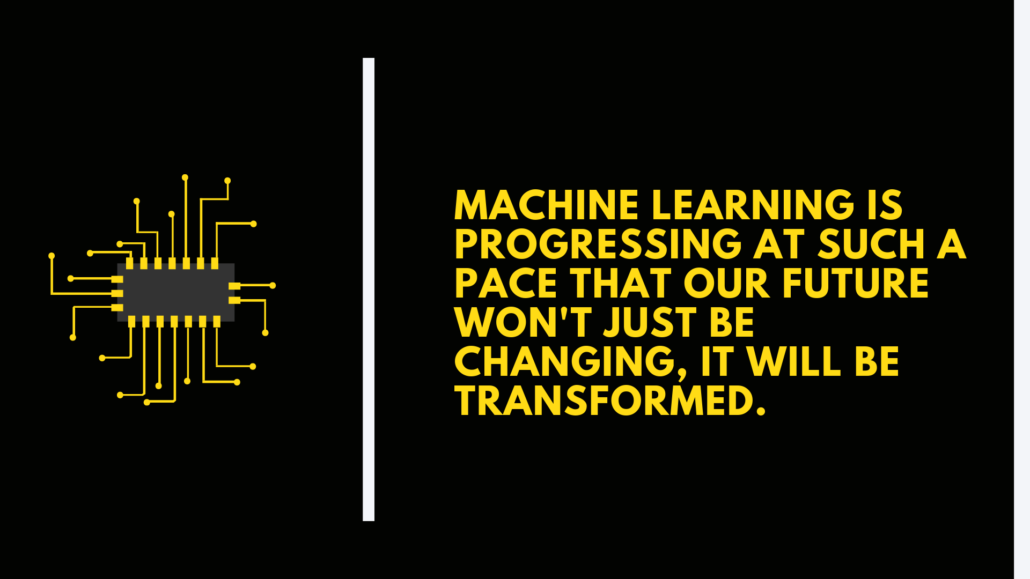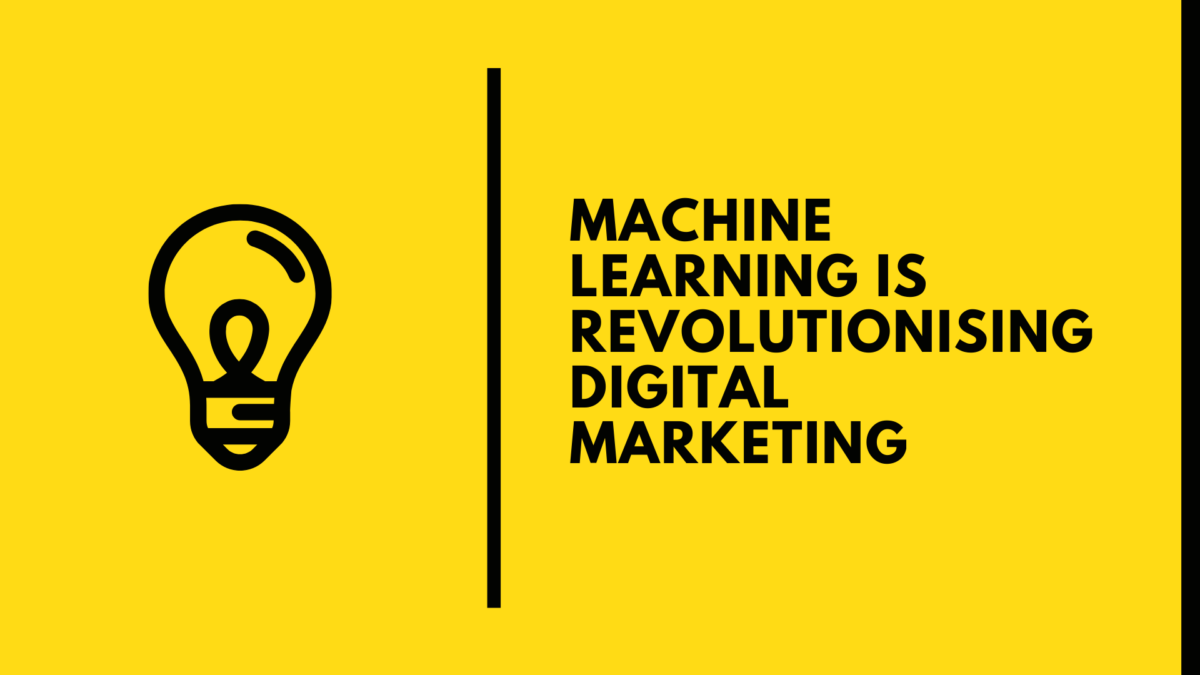Machine Learning (ML) is a subset of Artificial Intelligence that focuses on the development of computer programs that learn from experience. These programs can be self-learning, meaning they start with no knowledge and improve their intelligence as they collect more data.
When it comes to digital marketing, Machine Learning is a term that has been buzzing around the digital marketing industry recently with marketers wondering how it will affect their day-to-day tasks. In this article, we explore what Machine Learning means to digital marketing and why so many marketers are eager to jump on board.
What is Machine Learning?
Machine learning is a subset of artificial intelligence (AI). It is a process where a software system automatically improves its performance with time, without being explicitly programmed to do so.
Machine Learning is a type of artificial intelligence that learns from experience and data.
Machine Learning is an area of computer science that deals with teaching computers how to learn without being explicitly programmed. It covers areas like artificial intelligence, deep learning, neural networks, and many others. Machine Learning can be applied in various industries for tasks like rapid prototyping or automated data sorting.
The goal of machine learning is to turn data into meaningful insights. In the digital marketing world, this means that as companies gather more information about their customers’ behaviours and preferences, they can use this data to create personalised messages that will resonate with those customers.
Types of Machine Learning
Machine learning is a type of artificial intelligence that has been developed to complete tasks without human intervention. The three types of ML are supervised, unsupervised, and reinforced.
- Supervised Machine Learning is where algorithms are given a set of data and the goal is to learn from this data and make predictions. Supervised learning is the most basic type of machine learning and the algorithm is trained on labelled data. When used in the right circumstances supervised machine learning is very powerful.
- Unsupervised Machine Learning is where the algorithm is given a set of data and must learn to organise it into different categories on its own. The advantage of this type of machine learning is that unsupervised machine learning is able to work with unlabeled data meaning that no human labour is required to make the dataset machine-readable. This results in the algorithm finding on its own the relationship between any two data points, the so-called ‘hidden structure.’ These hidden structures are what allow the algorithm to be able to adapt to the data without a defined and set problem statement, making unsupervised machine learning versatile and offering a lot more post-deployment development than supervised machine learning.
- Reinforced ML is where the algorithm learns from both success and failure and can be trained by changing what action occurs after performing an action (for example, if the desired output was not achieved, then change the input).
Advantages of Digital Marketing with Machine Learning
Probably the simplest usage of machine learning in Digital marketing is finding patterns in user activities on a website. This helps digital marketers predict the further behaviour of users and quickly optimise page content and advertising offers.
Talking about content, machine learning is making content creation exponentially easier. With AI-powered writing, content writers don’t have to worry about writer’s block because the text will be automatically generated. The best part is that you can target different audiences with ‘content that connects’ as based on data the algorithm knows what your potential customers are interested in and what they find relevant.
Machine learning is a powerful, low-cost and readily available technology. If you want to increase your sales and profitability, as part of your global marketing plan you must consider this technology as well. The objective of content production through machine learning is to automate the whole process of content creation – perform certain actions based on certain criteria in your databases without human intervention.
Other usages of Machine Learning in digital marketing:
- Predictive analysis – using machine learning algorithms to predict the future of anything from sales trends to patterns in consumer engagement.
- Bots and AI chats on a website – providing set replies to frequently asked questions and directing the conversation to a human agent if the question is too complex.
- Dynamic pricing – setting the price of products o services dynamically depending on demand, availability and customer profiles.
- Smart advertising on social media.
Disadvantages of using Machine Learning for Digital Marketing
Machine learning is an enormous industry with loads of potential to go, but it does have some disadvantages. One of the most significant is that your competitors will be using it too. Just because you use machine learning for digital marketing doesn’t mean that you get an automatic upper hand on everyone else in the game. On the other side if you try to avoid using machine learning you will get exterminated by your competitors.

Joking aside one of the biggest problems of using machine learning in business is data acquisition. Machine Learning algorithms require massive data sets to train on. In order to get good outputs, the data has to be inclusive/unbiased, and of good quality (garbage in, garbage out).
If you train your algorithms with data that is small and not inclusive you end up with biased predictions coming from a biased data training set.
So it goes without saying that one of the key strategic decisions that digital marketers have to make is how to build high-quality datasets to train their learning algorithms.
Unfortunately, most businesses often have limited or no labelled data in the beginning, a situation that precludes business owners from investing in machine learning technologies to aid their digital marketing efforts.
Machine learning is a powerful tool that’s available, cheap, and accessible. If you’re looking to really ramp up your marketing game and optimize your results, this technology should be part of your marketing plan.
The future of Machine Learning in Digital Marketing
As machine learning becomes an increasingly essential part of our lives, it will give marketers the ability to perfect every detail of their digital campaigns for increased conversion rates and customer engagement.
Today it seems that everything is powered by machine learning. Whether you are searching for a new pair of shoes on the Internet, scrolling through your Facebook feed, or playing a game on your phone, algorithms are at work.
They know your favourite colour, they know your favourite car, they know your favourite brand and by assessing billions of data points across thousands of dimensions online they know you better than you know yourself. They know your past and based on your past they can predict what you want to buy before you even think about it.

Talking about digital customer experience as of the end of 2021, there are over 1.7 billion websites on the internet, which is more than ever before. This means that companies are competing with each other to make their own website stand out. One new way to do this is by using machine learning to analyse data and optimise marketing campaigns based on what they find. It can be very difficult for small businesses to compete with big corporations like Facebook and Google, however machine learning could give them an edge over these large companies in the future.
How to use Machine Learning in Digital Marketing effectively
Machine Learning can help reach desired marketing outcomes by analysing your customer data and recommending the best course of action. It’s not just about what you’re targeting, but how you’re targeting it. The more data you have on customer behaviour, the more easily Machine Learning will be able to provide recommendations.
Machine learning is a powerful and inexpensive resource that can be used to automate many of the more heavy-lifting tasks in the digital marketing world.
The first and most obvious way to use machine learning in digital marketing is to process large amounts of data on a variety of topics for your content marketing activities. This could be anything from natural language processing on tweets, sentiment analysis on posts, or customer service responses.
Machine learning also has some very valuable uses as an early warning system for anomalies such as sudden spikes in traffic or drop-offs in response rates.
Machine learning is not all about big data rollups, however. It can also be leveraged to power ad targeting by figuring out which ads are most likely to convert and serving those ads accordingly (and personalising the copy). As a result, you can target your audience more effectively and generate a higher conversion rate. In other words, machine learning helps you spend your ad budgets more efficiently, which directly translates to more dollars in the bank for your business.
The Tools: A good way to get started with Machine Learning is by taking advantage of readily available tools on the open web. If you’re looking for a good starting point, IBM Watson is probably the most popular first option at the moment. While there are a number of machine learning and AI tools available, we’re going to limit our discussion to a few that we think will help you get the most bang for your buck.
10 Most popular Machine Learning Software tools for Business
- ChatGPT is a chatbot (a natural language processing tool) developed by OpenAI and launched on November 30, 2022, and is designed to communicate with people using natural language. It is based on the Generative Pre-trained Transformer 3 (GPT-3) architecture, which is a type of deep learning model that is capable of generating text that is indistinguishable from text written by humans. ChatGPT has been trained on vast amounts of text data, which enables it to generate responses in a conversational way to a wide range of prompts (queries). It can understand and respond to questions, engage in natural conversations, and provide information on various topics including writing code like a developer and writing poems like a poet. ChatGPT’s abilities are continuously improving as it learns from new data and interactions with users.
- IBM Watson – leading data science and machine learning solution that helps enterprises accelerate AI-powered digital transformation. It allows businesses to scale trustworthy AI and optimise decisions.
- RapidMiner – one of the best tools we know for text mining and analytics. It’s not only very powerful but also very intuitive and easy to use.
- MATLAB – for making large data sets that are easier to analyse, sort and visualise.
- Alteryx – probably one of the best data preparation tools that makes it easy to run complex queries seamlessly with an intuitive interface.
- Tableau Server – one of the best tools for visualisation of data in multiple formats.
- RStudio – good for solving complex client problems by utilising the multi-linear regression models and time-series forecasts available through RStudio.
- Google Cloud AI Platform – easy to set up without the need for a lot of customisation and integrates well with Google BigQuery and Google PubSub making it easy to have a ready to use pipeline from data ingestion to analysis.
- TensorFlow – an open-source library that’s scalable with a vast library of functions for all kinds of tasks – Text, Images, Tabular, Video etc. – and good community support.
- Qlik Sense – a great solution for building complex data models and dashboards very quickly.
- Azure Machine Learning – a cloud-based service that can be used to automate building machine learning pipelines for classification, regression and forecasting tasks.
How can I apply it to my business?
Machine learning with AI is redefining how businesses are using technology to run their entire operations. This includes marketing teams who are looking for ways in which data can be analyzed in order to improve the effectiveness of marketing strategies.
Machine learning has been around for a while, but it’s only recently that it’s been integrated into the Internet of Things. This means that it can now analyze each customer’s behaviour and make helpful suggestions. For example, it can recommend certain items based on what the customer has purchased in the past. Or you can use machine learning to segment your customers and deliver personalised content, or in other words, you can use it to create a personalized user experience for your customers. You will be able to analyze how different pieces of content perform and what changes you should make to the platform in order to get the best conversion rates possible.
Before investing heavily in machine learning remember that this technology needs a lot of data, so you’ll need to be realistic about the amount of time and data you have available. It’s also important to collect as much detailed information as possible – for example, if your team is going through customer feedback on social media, make sure they’re taking screenshots of the messages and tagging them appropriately.
The best way to get started with machine learning is to use an existing algorithm. For example, you could start with Word2Vec, which only requires a couple of lines of code and is very fast. You don’t need to understand the underlying algorithm to get started; rather, you can simply use it as a starting point, or an “off-the-shelf” solution. From there, you can easily build additional functionality on top of it. This is how most AI-based businesses are created in the real world – start by building on an existing solution, and then adapt it to solve your specific problem.
You don’t need to understand the underlying algorithm to get started; rather, you can simply use it as a starting point.
Conclusion
In conclusion, machine learning is not just an emerging trend. It’s a powerful technology that will become even more important as the world continues to evolve. With so many possibilities for its use, businesses must start incorporating machine learning into their marketing strategies or risk being left behind.


Leave a Reply